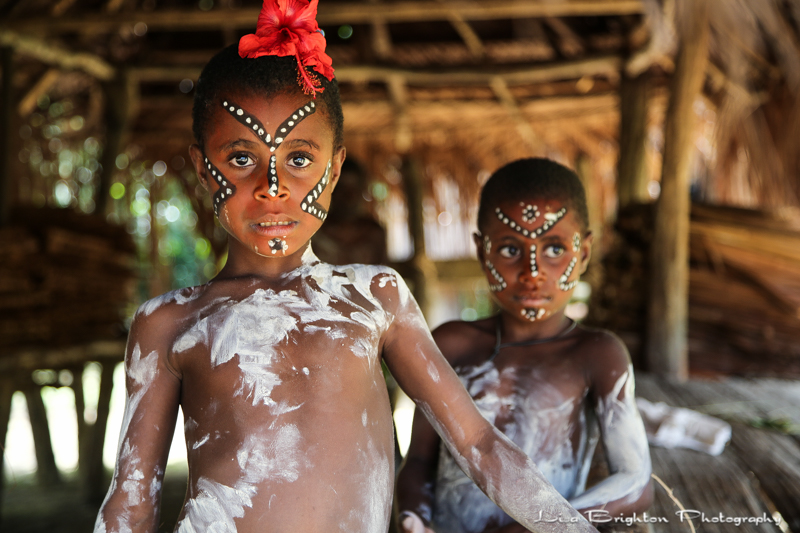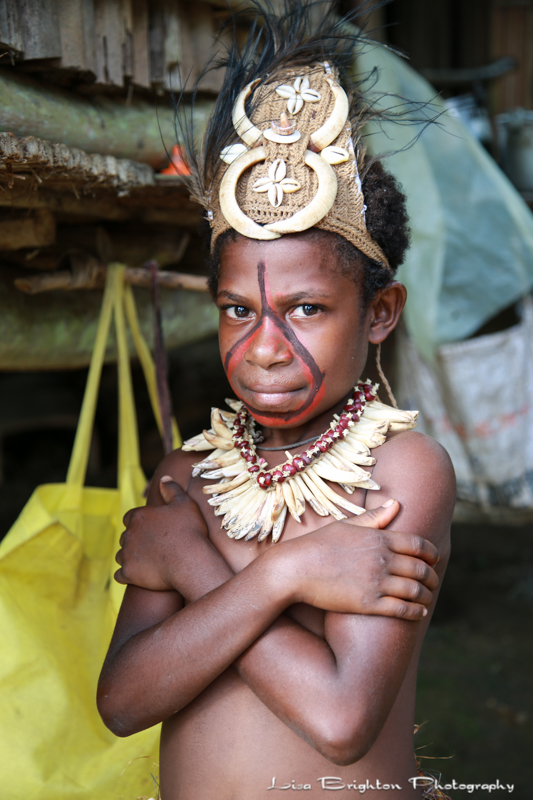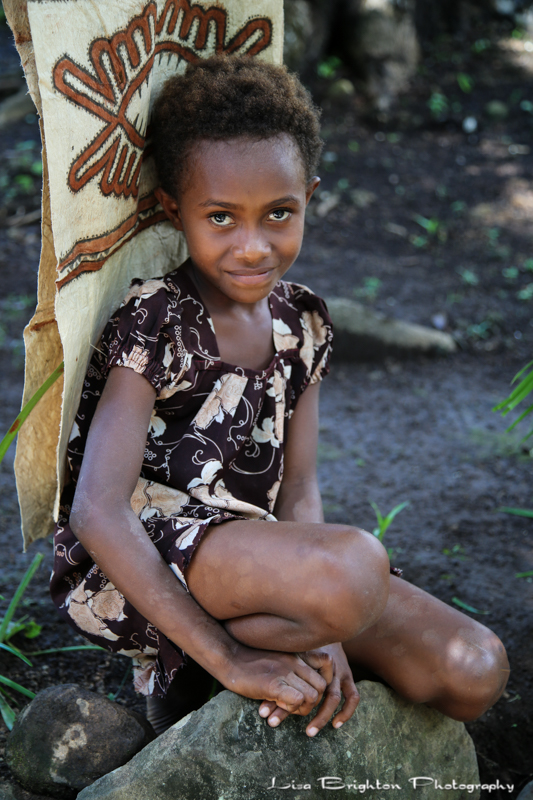9. Whiteout
 It makes my heart happy to meet children in small and remote villages around the world. Time and time again I’ve witnessed little, often naked bodies, joyfully running to greet a Jeep, or a small airplane landing with my fellow travelers and me on a dirt airstrip. On this journey though, most of the children run in tribal attire to the edge of the Karawari River to welcome the pontoon boat in which I’m traveling. I’m with my guide and seven other travelers who have “bucket-listed” the opportunity to immerse themselves in the mélange of tribal history and customs for which Papua New Guinea is famed. For the last several days I’ve photographed not only adults in traditional attire, but many children too. Plumage, costumes and body painting ranging from over-the-top on full frames to delicate feathers, flowers and dots sprinkled on tiny bodies have appeared before my lens. However, this morning is different. No feathers. No plumage. No extravagant attire. It’s western wardrobe with sundresses, shorts, and talk about the United States of America. Today the tables are turned and it’s me who stands before curious eyes. I’ve been asked to talk about my life in Michigan and share something that is unique to where I live.
It makes my heart happy to meet children in small and remote villages around the world. Time and time again I’ve witnessed little, often naked bodies, joyfully running to greet a Jeep, or a small airplane landing with my fellow travelers and me on a dirt airstrip. On this journey though, most of the children run in tribal attire to the edge of the Karawari River to welcome the pontoon boat in which I’m traveling. I’m with my guide and seven other travelers who have “bucket-listed” the opportunity to immerse themselves in the mélange of tribal history and customs for which Papua New Guinea is famed. For the last several days I’ve photographed not only adults in traditional attire, but many children too. Plumage, costumes and body painting ranging from over-the-top on full frames to delicate feathers, flowers and dots sprinkled on tiny bodies have appeared before my lens. However, this morning is different. No feathers. No plumage. No extravagant attire. It’s western wardrobe with sundresses, shorts, and talk about the United States of America. Today the tables are turned and it’s me who stands before curious eyes. I’ve been asked to talk about my life in Michigan and share something that is unique to where I live.  When first asked, I thought, what can I talk about that will be relatable to seven to ten-year-olds? The village that I’m in sits on a small island of off the coast of PNG. There is no electricity or modern conveniences. The people here live a very simple life – they haven’t even seen a jet-stream because no airplanes fly overhead. This remote location has many advantages, but it has prevented the English-speaking children from interacting with many people who are different from themselves. I’m told that this school visit will be only the third time that the students have seen a white person. While traveling in Africa in the past, I watched as saucer-eyed children walked up to touch my white skin. A look of amazement crossed their faces, because they were seeing something foreign and fascinating for the first time. Here, I can see the same reaction from across the classroom. I know that part of it is my light complexion. And I’m about to talk about something white – but it has nothing to do with the color of my skin. “Hello,” I say. “My name is Lisa Brighton. Thank you for letting me come to visit you in your school today.” I pan their sweet faces. As I make eye contact, some children shyly look away, but most are very focused and listening to me. “I live very far from here. Many airplanes away. And when I was your age I lived in a place with a lot of water, like your island has.” I notice one little boy looking out the window at a chirping bird perched on the palm-woven window frame. “And where I live there is weather like you have, with the sun and hot days and everything is green…” I hope that they are following where I’m going with this… “But there is also a change – it isn’t always green. It’s like when you don’t have sun and it rains for a long time.” I see a couple of heads nodding. “Where I grew up that rain gets very cold and it freezes, and when it falls from the sky it looks like this…” I
When first asked, I thought, what can I talk about that will be relatable to seven to ten-year-olds? The village that I’m in sits on a small island of off the coast of PNG. There is no electricity or modern conveniences. The people here live a very simple life – they haven’t even seen a jet-stream because no airplanes fly overhead. This remote location has many advantages, but it has prevented the English-speaking children from interacting with many people who are different from themselves. I’m told that this school visit will be only the third time that the students have seen a white person. While traveling in Africa in the past, I watched as saucer-eyed children walked up to touch my white skin. A look of amazement crossed their faces, because they were seeing something foreign and fascinating for the first time. Here, I can see the same reaction from across the classroom. I know that part of it is my light complexion. And I’m about to talk about something white – but it has nothing to do with the color of my skin. “Hello,” I say. “My name is Lisa Brighton. Thank you for letting me come to visit you in your school today.” I pan their sweet faces. As I make eye contact, some children shyly look away, but most are very focused and listening to me. “I live very far from here. Many airplanes away. And when I was your age I lived in a place with a lot of water, like your island has.” I notice one little boy looking out the window at a chirping bird perched on the palm-woven window frame. “And where I live there is weather like you have, with the sun and hot days and everything is green…” I hope that they are following where I’m going with this… “But there is also a change – it isn’t always green. It’s like when you don’t have sun and it rains for a long time.” I see a couple of heads nodding. “Where I grew up that rain gets very cold and it freezes, and when it falls from the sky it looks like this…” I  hold out my iPhone and press play to start a video of the snow heavily coming down on the frozen shoreline of Lake Superior. It’s a clip from last winter at my family’s cabin. “This white falling from the sky and on the ground is called ‘snow’. And all of this,” I say, pointing to the enormous frozen blocks of ice, “is called, ‘ice.’” I move towards another group of children straining to see what I’m talking about. I press play and restart the video so that they can see. I hear a tiny gasp as a jaw drops in awe. “And you know when it rains for a very long time, how there are puddles of water from your monsoon season?” I see some heads nodding. “Snow makes big piles, like this.” I point to a snowbank that is about five feet tall. “That snow would be where all of your sand is. There is sand here too, but it is under all of this white. And it stays like that for a long time. Just like your rain does.” I’m hoping that I’m making sense… “And under all of this white where there are no trees, that is a lot of water, but not as big as your water. The white ice covers it up until it gets warm again. And then it melts and goes away.” I press the start button again and show it for a third time. “Snow and ice are very beautiful, just like the place you live is. They’re just different, like your blue sky, palm trees and all of the pretty birds chirping are. When I go back home, I will think of all of you, and how very special it is here.”
hold out my iPhone and press play to start a video of the snow heavily coming down on the frozen shoreline of Lake Superior. It’s a clip from last winter at my family’s cabin. “This white falling from the sky and on the ground is called ‘snow’. And all of this,” I say, pointing to the enormous frozen blocks of ice, “is called, ‘ice.’” I move towards another group of children straining to see what I’m talking about. I press play and restart the video so that they can see. I hear a tiny gasp as a jaw drops in awe. “And you know when it rains for a very long time, how there are puddles of water from your monsoon season?” I see some heads nodding. “Snow makes big piles, like this.” I point to a snowbank that is about five feet tall. “That snow would be where all of your sand is. There is sand here too, but it is under all of this white. And it stays like that for a long time. Just like your rain does.” I’m hoping that I’m making sense… “And under all of this white where there are no trees, that is a lot of water, but not as big as your water. The white ice covers it up until it gets warm again. And then it melts and goes away.” I press the start button again and show it for a third time. “Snow and ice are very beautiful, just like the place you live is. They’re just different, like your blue sky, palm trees and all of the pretty birds chirping are. When I go back home, I will think of all of you, and how very special it is here.”
